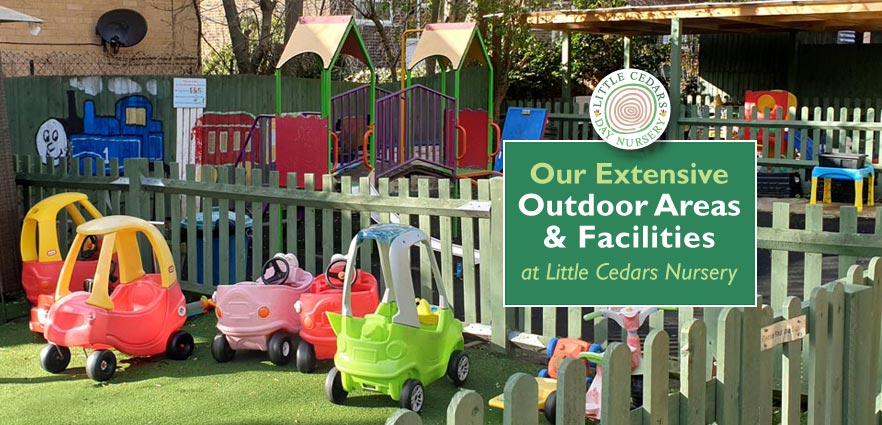
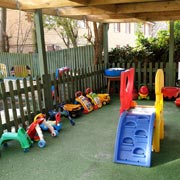 We have a huge outdoor area for children at Little Cedars Nursery, Streatham. Parents express their surprise when they first see it, regularly commenting that it’s much larger than the outdoor areas of other nurseries and pre-schools in the area. Our extensive outdoor play areas are also packed full of fun, educational play equipment and facilities that our under-five children absolutely adore. That includes areas and facilities set up especially for particular age groups.
We have a huge outdoor area for children at Little Cedars Nursery, Streatham. Parents express their surprise when they first see it, regularly commenting that it’s much larger than the outdoor areas of other nurseries and pre-schools in the area. Our extensive outdoor play areas are also packed full of fun, educational play equipment and facilities that our under-five children absolutely adore. That includes areas and facilities set up especially for particular age groups.
Outdoor Facilities & Equipment for Babies
Babies can enjoy sensory toys and equipment, soft play, sand play, water play and even a baby slide. They also have their own baby garden, which is lovely and shaded, to keep them out of direct sun.
Outdoor Equipment for Toddlers & Preschoolers
Toddlers and preschoolers can enjoy equipment like climbing frames, multiple slides along with lots and lots of bikes, trikes, cars and scooters. They even have a basketball area, hoops and lots of footballs for budding soccer players.
Outdoor Facilities for Everyone
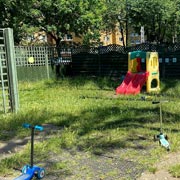 The outdoor ‘mud kitchen’ is a particular hit with children at the nursery. They can enjoy creating in the sand play and water play areas too. These are fun and educational activities — messy play is important as part of a healthy early years education. Construction activities also happen naturally with the varied facilities and equipment on offer outdoors at the nursery.
The outdoor ‘mud kitchen’ is a particular hit with children at the nursery. They can enjoy creating in the sand play and water play areas too. These are fun and educational activities — messy play is important as part of a healthy early years education. Construction activities also happen naturally with the varied facilities and equipment on offer outdoors at the nursery.
Children also have access to a lovely, shaded, grassy area in the amazing garden, where they can get closer to nature and all of the benefits it brings to little ones.
Children at the nursery can also play “parents” with the prams that they can wheel around. Or, there are play tunnels, climbing frames and other exploration type activities for the more adventurous.
Animal Enclosure & Vegetable Patch
 Interaction with animals and pets is important during the early years. Therefore, children also have access to quite a wide variety of well-kept creatures. For example, the nursery children help to raise chicks and, once matured into chickens, they are moved to the lovely enclosure that the nursery has outside. Rabbits (currently Miffy and Bella) also live outside and children love to help look after them, stroke them and so on. We teach children to treat them with respect, as individuals in their own right. Such lessons are invaluable at this young age.
Interaction with animals and pets is important during the early years. Therefore, children also have access to quite a wide variety of well-kept creatures. For example, the nursery children help to raise chicks and, once matured into chickens, they are moved to the lovely enclosure that the nursery has outside. Rabbits (currently Miffy and Bella) also live outside and children love to help look after them, stroke them and so on. We teach children to treat them with respect, as individuals in their own right. Such lessons are invaluable at this young age.
We also have a wonderful vegetable patch outside for children to enjoy and learn from. Teaching children to look after living plants also gives them many valuable lessons and ending up with vegetables that they’ve grown and can eat is a magical experience for them.
[Having animals at Little Cedars Nursery] “enables children to actively learn about nature and gain hands-on experience of caring for living things.” (Ofsted)
All-Weather Outdoor Activities
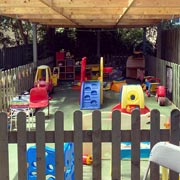 As you can see from some of the photographs, the nursery’s extensive outdoor areas include both open-air and undercover areas. That means children can play and explore whatever the weather. Outdoor play is good for children, teaching them some things that simply can’t be taught indoors, so it’s wonderful that many of the outdoor facilities can be used all-year-round.
As you can see from some of the photographs, the nursery’s extensive outdoor areas include both open-air and undercover areas. That means children can play and explore whatever the weather. Outdoor play is good for children, teaching them some things that simply can’t be taught indoors, so it’s wonderful that many of the outdoor facilities can be used all-year-round.
Children Learn Through Play
Children learn primarily through play at Little Cedars Nursery. This has been shown to be by far the best way for under-fives to learn and develop physically during their early years. As well as learning through outdoor games, tasks, nature and the open air environment, children will be quietly improving physical skills outdoors, like balance, coordination and motor skills. They’ll also be gaining strength and fitness through exercise, even if they don’t realise they’re exercising when playing outdoors. That’s just one of the many benefits of outdoor play.
Outdoor Play Supports the EYFS Curriculum Too
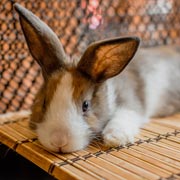 Outdoor play at Little Cedars Nursery also supports the Early Years Foundation Stage (EYFS) curriculum. Learning through outdoor play teaches children so much and in a natural way. Outdoor play supports such areas as communication & language, physical development, personal, social and emotional development and understanding the world. Many such lessons come naturally as children play with one another and interact together via outdoor activities.
Outdoor play at Little Cedars Nursery also supports the Early Years Foundation Stage (EYFS) curriculum. Learning through outdoor play teaches children so much and in a natural way. Outdoor play supports such areas as communication & language, physical development, personal, social and emotional development and understanding the world. Many such lessons come naturally as children play with one another and interact together via outdoor activities.
A 360° Early Years Learning Experience
The equipment, resources and zones in the outdoor areas are designed to excite, stimulate and engage the children. Specific playing and learning activities and their exact make-up are also guided by early years practitioners at the nursery, along with each child’s “Key Person”. 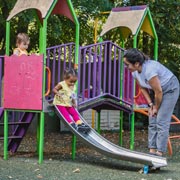 Such staff will continuously identify the individual interests and needs of each child and ensure that the learning and development activities they access will benefit them in the optimum ways. The idea is to further strengthen existing areas where children are strong, while bolstering children’s skills in areas that may require extra focus.
Such staff will continuously identify the individual interests and needs of each child and ensure that the learning and development activities they access will benefit them in the optimum ways. The idea is to further strengthen existing areas where children are strong, while bolstering children’s skills in areas that may require extra focus.
Older children can move freely from indoors to outdoors, under supervision of course, and thereby benefit from the inside facilities and equipment as well as those outdoors. This gives them a well-rounded playing and learning experience at the setting.
Are You Looking for Good Nurseries/Pre-schools in Streatham?
Little Cedars is officially rated by Ofsted as a Good Nursery and pre-school. We’re in Streatham, near Furzedown, Tooting, Balham, Norbury & Colliers Wood

 Little Cedars Nursery is officially rated as a good provider of childcare by Ofsted. So, if you’re looking for the best start for your child in the Streatham area, please consider us and — even better — come for a visit. We’d love to show you and your little one around! We are a good nursery and pre-school in Streatham offering high quality childcare services near Streatham Hill, Streatham Park, Streatham Common and Furzedown. We’re very near to Tooting, Tooting Bec, Tooting Broadway, Tooting Common, Balham, Norbury and Colliers Wood too, so may be a good solution to your childcare needs if those locations are near you. Click a button below to get started with your application, a nursery tour or simply to ask us a question. We’ll be happy to help.
Little Cedars Nursery is officially rated as a good provider of childcare by Ofsted. So, if you’re looking for the best start for your child in the Streatham area, please consider us and — even better — come for a visit. We’d love to show you and your little one around! We are a good nursery and pre-school in Streatham offering high quality childcare services near Streatham Hill, Streatham Park, Streatham Common and Furzedown. We’re very near to Tooting, Tooting Bec, Tooting Broadway, Tooting Common, Balham, Norbury and Colliers Wood too, so may be a good solution to your childcare needs if those locations are near you. Click a button below to get started with your application, a nursery tour or simply to ask us a question. We’ll be happy to help.

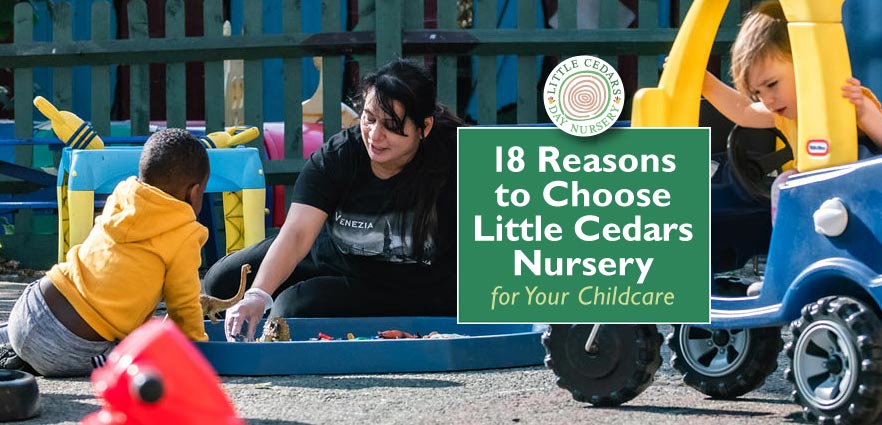
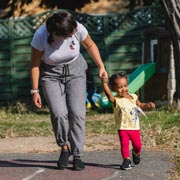 Independent feedback from other parents is worth its weight in gold. In the last five years, Little Cedars has received only 5-star reviews on Google and Facebook. That’s top marks, consistently for 5 years running.* Comments that accompanied these independent reviews were equally compelling — here are just a few examples:
Independent feedback from other parents is worth its weight in gold. In the last five years, Little Cedars has received only 5-star reviews on Google and Facebook. That’s top marks, consistently for 5 years running.* Comments that accompanied these independent reviews were equally compelling — here are just a few examples: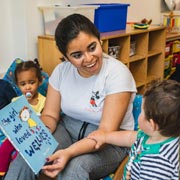 Little Cedars is a warm, welcoming and nurturing environment. To the babies and children, it very much becomes a home-from-home where they feel safe, valued, cared for and all with wonderful, close relationships with both peers and our childcare professionals. It’s also a place of immense fun where little ones are happy, stimulated and nurtured in order to bring out the best in them.
Little Cedars is a warm, welcoming and nurturing environment. To the babies and children, it very much becomes a home-from-home where they feel safe, valued, cared for and all with wonderful, close relationships with both peers and our childcare professionals. It’s also a place of immense fun where little ones are happy, stimulated and nurtured in order to bring out the best in them.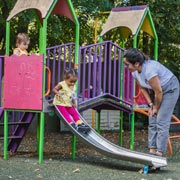 Little Cedars Nursery is extremely well resourced and equipped, both inside and out.
Little Cedars Nursery is extremely well resourced and equipped, both inside and out. 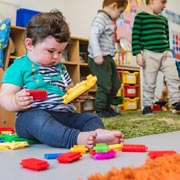 If your 2-year-old is eligible for the Government’s free childcare scheme for this age group, rest assured that Little Cedars Day Nursery supports them and this can potentially give your little one 15 free hours of childcare per week for as many as 38 weeks of the year. That’s 570 free childcare hours per year for your 2-year-old!
If your 2-year-old is eligible for the Government’s free childcare scheme for this age group, rest assured that Little Cedars Day Nursery supports them and this can potentially give your little one 15 free hours of childcare per week for as many as 38 weeks of the year. That’s 570 free childcare hours per year for your 2-year-old!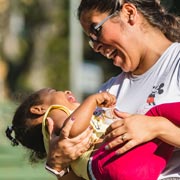 A Key Person is assigned to each child at Little Cedars Nursery. This is an early years practitioner who ensures that the child’s needs are being catered for and that their care at the setting is tailored to them as an individual. They help children settle in when they first join the nursery and build strong relationships with both the child and the parents. They are therefore usually the natural and key point of contact at the nursery.
A Key Person is assigned to each child at Little Cedars Nursery. This is an early years practitioner who ensures that the child’s needs are being catered for and that their care at the setting is tailored to them as an individual. They help children settle in when they first join the nursery and build strong relationships with both the child and the parents. They are therefore usually the natural and key point of contact at the nursery.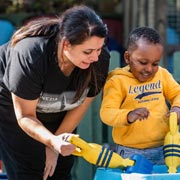 We have a very special team at Little Cedars Nursery. Every one of them has been hand picked to ensure they are the perfect fit for the nursery and for the children therein. They’re warm, natural carers who will form wonderful relationships with children and bring out the very best in them. They become the children’s safe, familiar and friendly faces at the setting as well as facilitating top-notch learning and early years education. They also ensure every child is happy and is having fun whilst under our care.
We have a very special team at Little Cedars Nursery. Every one of them has been hand picked to ensure they are the perfect fit for the nursery and for the children therein. They’re warm, natural carers who will form wonderful relationships with children and bring out the very best in them. They become the children’s safe, familiar and friendly faces at the setting as well as facilitating top-notch learning and early years education. They also ensure every child is happy and is having fun whilst under our care.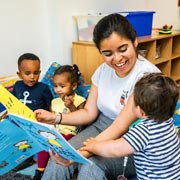 At Little Cedars we do so much more than simply look after babies, toddlers and under-fives. We educate and nurture them too. In fact, we ensure that our little ones achieve personal bests in all 7 areas of
At Little Cedars we do so much more than simply look after babies, toddlers and under-fives. We educate and nurture them too. In fact, we ensure that our little ones achieve personal bests in all 7 areas of 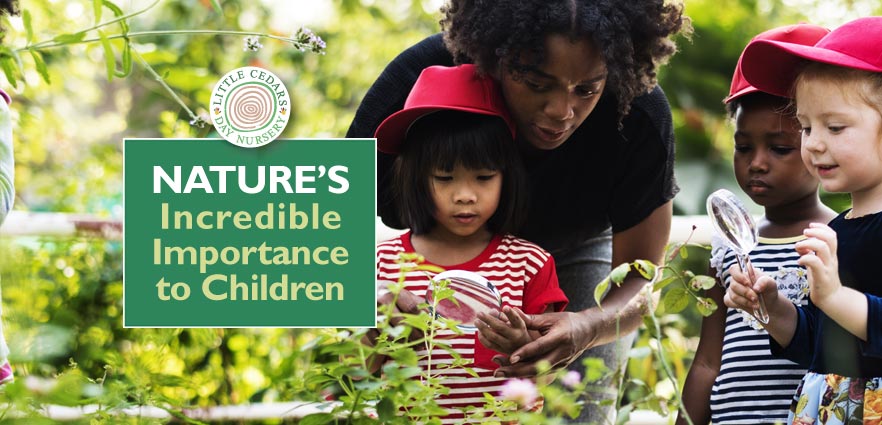
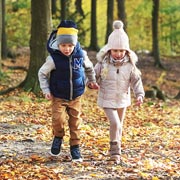 It’s amazing how much nature benefits children, particularly in their early years when they’re finding out about the world around them — and also learning about themselves. There have been many studies into the importance of nature, to youngsters in particular, and the studies all reach a similar conclusion — nature is incredibly important and beneficial to children. Today we’ll explore the topic and learn why children should regularly access the natural world.
It’s amazing how much nature benefits children, particularly in their early years when they’re finding out about the world around them — and also learning about themselves. There have been many studies into the importance of nature, to youngsters in particular, and the studies all reach a similar conclusion — nature is incredibly important and beneficial to children. Today we’ll explore the topic and learn why children should regularly access the natural world.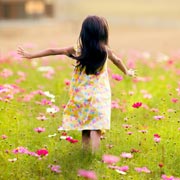 Stress is also reduced on both a mental and physiological level through exposure to a natural environment. In studies, stress hormone and blood pressure levels both improved after exposure to nature, helping children both physically and emotionally. Nature seems to be a great way to recharge children’s batteries and lower stress and anxiety, as well as improving attention, engagement and academic performance. That includes improvements in important skills like reading, writing and mathematics.
Stress is also reduced on both a mental and physiological level through exposure to a natural environment. In studies, stress hormone and blood pressure levels both improved after exposure to nature, helping children both physically and emotionally. Nature seems to be a great way to recharge children’s batteries and lower stress and anxiety, as well as improving attention, engagement and academic performance. That includes improvements in important skills like reading, writing and mathematics. Improved social skills and even wider circles of friends due to the opportunities offered through outdoor play and adventure.
Improved social skills and even wider circles of friends due to the opportunities offered through outdoor play and adventure.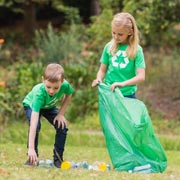 The new skills, knowledge and freedom that nature gives children also helps them to become more self-confident and independent individuals.
The new skills, knowledge and freedom that nature gives children also helps them to become more self-confident and independent individuals.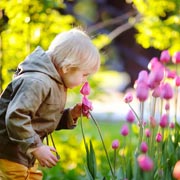 Even in built-up cities like London, immersion in nature is possible via gardens, parks, commons or, if you’re lucky to have them near you, nature reserves and nature gardens. There are many of these dotted around London, including
Even in built-up cities like London, immersion in nature is possible via gardens, parks, commons or, if you’re lucky to have them near you, nature reserves and nature gardens. There are many of these dotted around London, including  If you’re searching for
If you’re searching for 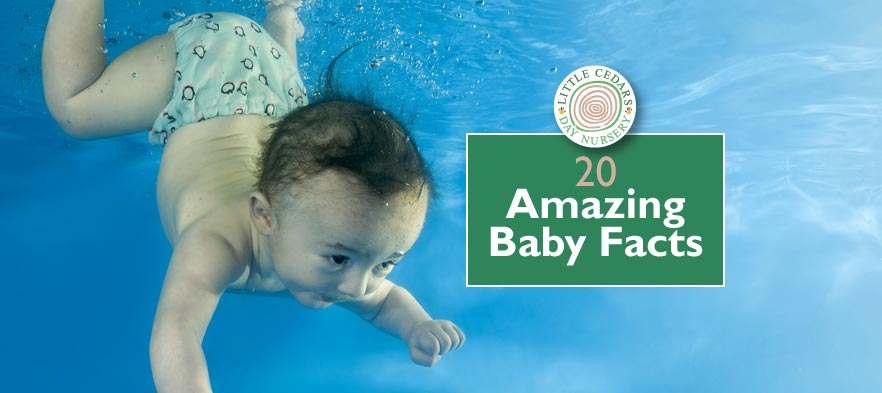
 3. Almost 50% More Bones Than Adults
3. Almost 50% More Bones Than Adults 6. Not So Hot on Eye Sight
6. Not So Hot on Eye Sight 9. Natural Born Swimmers (… Kind of)
9. Natural Born Swimmers (… Kind of) 14. Is Breast Really is Best?
14. Is Breast Really is Best? 16. The Only Smiling Primate
16. The Only Smiling Primate 19. Outcomes of Being First Born
19. Outcomes of Being First Born We are Little Cedars,
We are Little Cedars, 